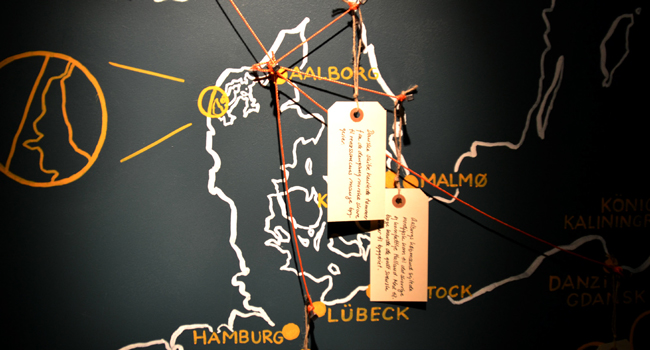Explorative Museum Experiences
- a collaborative experience design process for explorative museum exhibitions
By Kristina Madsen
Through this dissertation, I have approached the challenges of balancing the enlightenment and experiences presented to museum institutions by the experience economy from an experience design perspective in collaboration with a smaller Danish museum. In the dissertation, it is my hypothesis that designing for explorative user interactions in exhibition design, enlightenment and experience can be balanced. Furthermore, I hypothesise that IT-based experience design can be a useful design approach for said explorative interactions due to its holistic characteristics and inclusive scope, which borrows design criteria from other fields of design. As such, the research was guided by the following research question:
How can principles of IT-based experience design guide the design, implementation and evaluation of an explorative museum exhibition?
The goal was to identify key criteria and principles for these types of design processes through a series of experiments that collectively sought to expand and add to the existing field of knowledge within museum experience design. Thus, knowledge was generated that can bridge the gap between theory and the practice of applying experience design as a collaborative design process for exhibition making.
Through my research, and in collaboration with the Limfjord Museum, I have explored the potentials of learning through experiences via an experience design perspective and a collaborative design process, one which was informed and guided by principles of experience design. Furthermore, through this research, I have applied criteria of emergent narratives – user-mindset, agency, storification and narrative closure – to the exhibition design to create a space for exploration, with the argument that users should be more active participants in creating their own experiences and narratives to encourage informal learning, instead of more passively receiving predefined and structured narratives. The criteria for exploration defined in the dissertation both created the foundation for designing for exploration and identified and evaluated explorative user interactions through four strategies for emergent user interactions: two were design-driven, by Design and by Redesign; and two were design user-driven, Creative Play and by Hacking.
In the dissertation, I have shown how collaborative design processes can be guided with experience design for exhibition making and how collaboration in this process creates a foundation for balancing content and form for exploration by integrating the work of museum professionals and design researchers throughout the design process.
I have shown how explorative museum experience has the potential to both balance enlightenment and experience and support the informal learning experience. When designing for exploration, is not a third perspective in the enlightenment–experience dichotomy, but an approach to dissolve the conflict and balance enlightenment and experience to avoid disneyfication and formal learning. Thus, designing purposeful exhibitions provides users with the opportunity for meaning making through their active participation in the museum experience. These contributions are condensed into a theoretical framework, the ExD-framework, which is grounded in my experiments and aimed at designing for exploration with experience design.
This research was conducted for a PhD project partly funded by the Department of Communication & Psychology at Aalborg University, in association with the research centre, Interactive Digital Media and Experience Design; and partly funded by the national research programme, Our Museum, which consists of 13 research projects representing five Danish universities and eight museums, one of which was the collaborative museum explored in this research project: the small Danish maritime museum, Limfjordsmuseet (the Limfjord Museum). Part of the research was conducted during a research stay at the Royal Melbourne Institute of Technology (RMIT University) in Melbourne, Australia.

